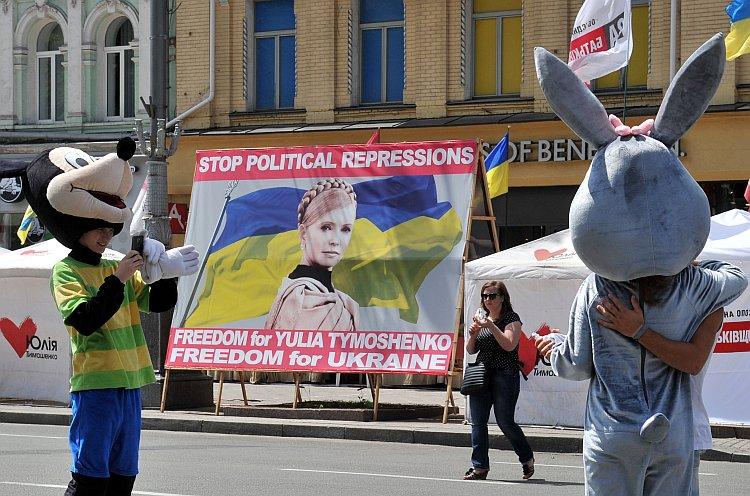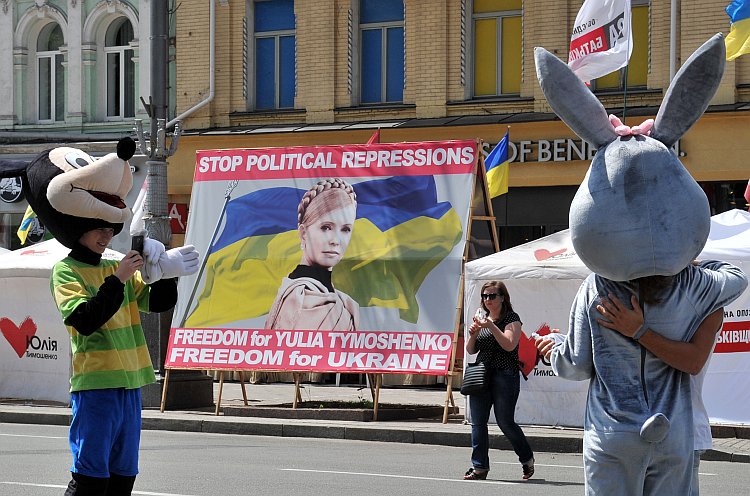KYIV, Ukraine—This week Ukraine plays host to the European soccer championship, an event many had hoped would bring much needed political and social reforms, but increasingly, locals say it looks like a lost opportunity.
The European championship could have changed Ukraine, said Ukraine soccer fan, Alexander Omelnitskiy, but it never got beyond a chance.
Instead officials “typically misused the state funds while entrepreneurs just want to make quick money from Europeans,” he says.
Ukraine and Poland won the right to host the European Football Tournament, Euro 2012, five years ago. At the time, Ukrainian authorities declared that the country would come closer to European values and the world would speak of Ukraine as a European country.
But for Ukraine to adopt more open European values people must strive for them, Omelnitskiy says. That has not happened and all the soccer tournament will show is that the county is not ready to host an international event.
“I think beyond the soccer itself, Ukraine has kissed the dust because it has not managed to address its own problems,” he pointed out.
Meanwhile, the public is waiting to see which European leaders will attend the tournament as many officials from Europe indicated they would boycott Ukraine’s events.
The Ukraine’s relationship with the European Union has been especially troubled since the arrest of former Prime Minister Yulia Tymoshenko on corruption charges, in August last year.
The former leader received a seven-year prison sentence last October for gas deals she made with Russia in 2009. She is also accused of tax evasion when she was involved in running a gas company in late ‘90s. She is now being treated by German doctors having refused to be examined by local doctors. Her health has also worsened during her imprisonment.
The EU has adopted a number of resolutions urging Kyiv to release Tymoshenko and her allies; the boycotts are seen as another means to pressure the former Soviet bloc country.
On June 7, spokeswoman of the European Commission Pia Ahrenkilde Hansen said again, neither the EC president nor other commissars would attend any matches in Ukraine.
The U.K., Sweden, and France have already boycotted early tournament matchups, sending ambassadors but no high-ranking officials from home. The U.K. foreign office said it would decide later about later stage games.
President Viktor Yanukovych insists that his archrival has been jailed on legal grounds. Ukraine’s Ministry of Foreign Affairs stated on June 5 that boycotting the football tournament will achieve little.
“It is not a suitable way. If some [European] leaders do not attend the championship, it will not resolve the Tymoshenko case,” said ministry spokesperson Oleg Voloshyn.
The Ukrainian opposition has rejected the boycott, but wants to maintain pressure on authorities. Tymoshenko told the vice president of European Parliament Jacek Protasiewicz when he visited her in Kharkov prison in May, that boycotting Euro 2012 was a bad idea, but she supported a “political boycott.”
Concern about human rights in Ukraine, including imprisonment of opposition politicians and racism, has reportedly impacted visitor numbers during the Euro 2012.
The government estimated that about 1 million tourists would come to Ukraine. However, according to Erste Bank, a branch of Austrian bank in Ukraine, only 500,000 fans planned visits. The Ukrainian association of small hotels and apartments predicted that less than 400,000 visitors during the championship.
To capture that opportunity, rental apartments rates have increased significantly reaching 200 euros ($250) per night for a one-bedroom unit; hotel prices have also skyrocketed, Ukraine news agencies reported.
While the authorities have recently praised themselves for their Euro 2012 preparations, building soccer stadiums and new international airport terminals, they have been criticized for not solving real problems like building roads, improving services, and the misuse of state funds.
Political expert, Peter Oleshchuk, said that the Ukrainian authorities always “create the appearance of solving problems and nobody has yet gone beyond that.”
“This is what Ukrainian politicians are all about,” he said in a blog posting.
Yuriy Yakovlev, a lawyer living in host city Lviv, thinks that the only benefit Euro 2012 will leave is infrastructure, and the country will be far off from Europe both politically and economically.
Europeans know about corruption in Ukraine and are aware that people have to make money from foreigners.
“Euro 2012 will benefit restaurants owners and oligarchs who laundered money from construction projects,” he said. “Ordinary people will not taste Euro 2012. This event is not for them.”
After Euro 2012, people’s concerns about Ukraine’s progress on the path to reform will be confirmed, he said adding, “So it will be the first and the last great tournament for us.”
The Epoch Times publishes in 35 countries and in 19 languages. Subscribe to our e-newsletter.






